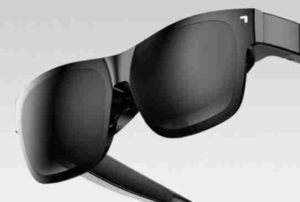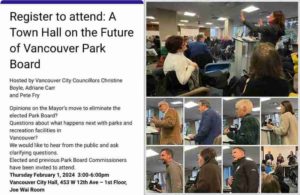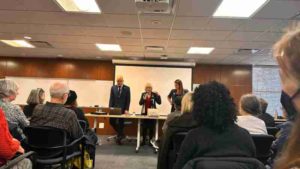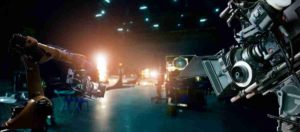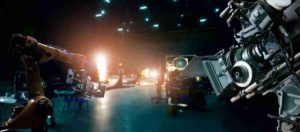
Top left: Rabbit R1 | Bottom: 2024’s LG OLED TV are transparent TV sets you can see — and see through.
Year after year, the annual Consumer Electronics Show held in Las Vegas each January brings with it all sorts of amazing demos, gizmos and hi-tech concepts that you won’t be available to buy for years, if ever.
But if you’re looking to snag some fabulous and futuristic products from CES 2024, don’t fret. In today’s Tech column, VanRamblings has gathered a few cool gadgets you can purchase right now, or put a dent in your bank balance very soon.
CES 2024 Best in Show | Best TV | LG OLED M4 | $3400

When it comes to innovative or life-changing new tech, it takes a lot to be the best of the best. Today we’ll provide some insight into the products that emerged out of CES we think have the power to improve everyday life.
LG’s 2024 OLED TVs come with upgraded AI upscaling utilizing precise pixel-level image analysis, that effectively sharpen objects that may appear blurry.
All driven by the discerning judgment of the AI itself, LG’s signature OLED M4 TV delivers a clearer, more vibrant viewing experience. An ingenious artificial intelligence (AI) processor adeptly refines colours by analyzing frequently used shades that best convey the mood and emotional elements intended by filmmakers and content creators. Dynamic Tone Mapping Pro splits pictures into blocks and fine-tunes brightness and contrast by analyzing variations in brightness where light enters the scene, creating images that look more three-dimensional.
In addition to its 97″, 83″ and 77″ models there’s a more normal-size 65-inch LG OLED M4 version that could actually fit into your home — and cost less, too.
VanRamblings bought CES 2023’s Best in Show Samsung NeoQLED Tizen Smart TV on Black Friday. Priced at $2999 last March, we picked it up for only $1250!
CES 2024 Best in Show | Best Gadget | Rabbit R1 | $199

Set to become all the rage among the tech-forward crowd later this year, and predicted to catch on with the tech-oriented general public soon after, the Rabbit R1 is a lot like a phone in terms of its looks, and in some of its features: it has a camera and a SIM card slot, and it supports Wi-Fi and Bluetooth. What’s different, and what makes the Rabbit R1 special, is the interface: instead of a grid of apps, you get an AI assistant that talks to your favorite apps and does everything for you.
For example, you could get the R1 to research a holiday destination & book flights to it, or queue up a playlist of your favourite music, or book you an Uber. In theory, you can do almost anything you can already do on your phone, just by asking.
We’ve seen next-gen personal assistants depicted in movies like Her, and the R1 is trying to make that a reality — leveraging the latest AI capabilities to replace the traditional smartphone interface with something a lot more intuitive.
CES 2024 Best in Show | Gaming Device | XREAL Air 2 AR glasses | $489
The XREAL Air 2 Ultra AR glasses offer the most advanced augmented reality wearable experience from the brand to date with hand and head tracking meeting spatial anchoring across a full 6DoF (six degrees of freedom).
Augmented reality (AR), mixed reality (MR), extended-reality (XR), whatever you want to call it, 2024 is lining up to be a big year for this tech with the popularity of the Meta Quest 3 expanding and Apple’s release of its Vision Pro headset.
CES 2024 Best in Show | Bemis BB-1200 Bidet Toilet | $399

If you’re less about TVs and AI, and more about something weird (and potentially practical), then there’s always the new Bemis BB-1200 Bidet Toilet. That’s right, it’s a smart toilet seat, capable of supplying unlimited warm water, a heated seat, air dryer alongside a remote and smartphone app to control it all.
You can really control everything from nozzle position to water pressure and seat temperature. There are even two user pre-sets so your preferences are saved and ready to go when you need it most. It sounds silly, but if it makes your bathroom experience a little more comfortable (especially in the cold winter months), then you shouldn’t dismiss it quite so easily.
The BB-1200 will be available this spring, and will set you back $399. Just make sure your bathroom has an outlet near the toilet to power everything.
CES 2024 Best in Show | Best Home Product | Family Hub+ | $2499

Samsung has gone all-in on artificial intelligence across its phones and home appliances. This includes a new AI Family Hub+ technology that is designed to bring together different appliances.
It is initially being built into the new Bespoke 4-door flex refrigerator, unveiled at CES 2024. This includes internal cameras and AI vision capable of identifying individual food items. It can then suggest recipes based on what you have in stock.
CES 2024 Best in Show | Roborock Zeo One | $1699
The Roborock Zeo One is an all-in-one washer / dryer combo machine that pulls double duty. It’s part of a relatively new breed of laundry combo machines that are just beginning to proliferate. Needless to say, the concept is compelling: you pile a load of laundry into a single machine where it’s washed and dried. But the Zeo One adds even more innovation to the mix.
A favourite feature: smart dosing. Instead of adding detergent and fabric softener with each load, you can fill the reservoirs and go for months without worrying about adding anything to your laundry.
The Zeo One also dries clothes using much less heat than a conventional dryer.
The Zeo-cycle drying system uses a large honeycomb-shaped disc with more than 20,000 holes to absorb moisture, using sensors and an AI algorithm to monitor the drying system more than 100 times per minute. By keeping the heat low, the Roborock Zeo One prevents damage to delicate garments like wool sweaters.
The Zeo One even collects lint and disposes of it automatically through a water line, so you never have to clear a lint trap.
CES 2024 Best in Show | Health Device | BeamO | $249

Withings’ BeamO might be the only health checkup device you need in your home, a first-of-its-kind 4-in-1 health checkup device meant to replace four essentials that should be in every home, combining an ECG, pulse oximeter, stethoscope, and thermometer into a single compact device. With it, you can monitor your heart and lung health, as well as your temperature.
There are those in the medical profession who believe the BeamO will revolutionize the measurement of the core vitals carried out during medical visits from the comfort of one’s own home. This crucial data will provide a vital overview of overall health or warning signs of potential areas of concern. Instead of measuring these stats a couple of times a year in a clinical setting, it will be possible to assess them every day. BeamO will be the thermometer of the future, providing the ability to assess temperature and observe the state of the heart and lungs.
Of course, a parent can also use the device to perform a checkup on a child.
In the future, the company says the BeamO will detect signs of infection and even possible cardiovascular issues such as atrial fibrillation (AfiB).
The Withings BeamO will be released this coming June, and will retail for $249.

